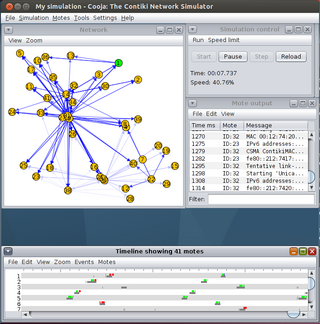
Internet Protocol version 6 (IPv6) is the most recent version of the Internet Protocol (IP), the communications protocol that provides an identification and location system for computers on networks and routes traffic across the Internet. IPv6 was developed by the Internet Engineering Task Force (IETF) to deal with the long-anticipated problem of IPv4 address exhaustion, and was intended to replace IPv4. In December 1998, IPv6 became a Draft Standard for the IETF, which subsequently ratified it as an Internet Standard on 14 July 2017.

Contiki is an operating system for networked, memory-constrained systems with a focus on low-power wireless Internet of Things (IoT) devices. Contiki is used for systems for street lighting, sound monitoring for smart cities, radiation monitoring and alarms. It is open-source software released under the BSD-3-Clause license.
OpenVPN is a virtual private network (VPN) system that implements techniques to create secure point-to-point or site-to-site connections in routed or bridged configurations and remote access facilities. It implements both client and server applications.
Datagram Transport Layer Security (DTLS) is a communications protocol providing security to datagram-based applications by allowing them to communicate in a way designed to prevent eavesdropping, tampering, or message forgery. The DTLS protocol is based on the stream-oriented Transport Layer Security (TLS) protocol and is intended to provide similar security guarantees. The DTLS protocol datagram preserves the semantics of the underlying transport—the application does not suffer from the delays associated with stream protocols, but because it uses User Datagram Protocol (UDP) or Stream Control Transmission Protocol (SCTP), the application has to deal with packet reordering, loss of datagram and data larger than the size of a datagram network packet. Because DTLS uses UDP or SCTP rather than TCP it avoids the TCP meltdown problem when being used to create a VPN tunnel.
6LoWPAN was a working group of the Internet Engineering Task Force (IETF). It was created with the intention of applying the Internet Protocol (IP) even to the smallest devices, enabling low-power devices with limited processing capabilities to participate in the Internet of Things.
An IPv6 transition mechanism is a technology that facilitates the transitioning of the Internet from the Internet Protocol version 4 (IPv4) infrastructure in use since 1983 to the successor addressing and routing system of Internet Protocol Version 6 (IPv6). As IPv4 and IPv6 networks are not directly interoperable, transition technologies are designed to permit hosts on either network type to communicate with any other host.
Server Name Indication (SNI) is an extension to the Transport Layer Security (TLS) computer networking protocol by which a client indicates which hostname it is attempting to connect to at the start of the handshaking process. The extension allows a server to present one of multiple possible certificates on the same IP address and TCP port number and hence allows multiple secure (HTTPS) websites to be served by the same IP address without requiring all those sites to use the same certificate. It is the conceptual equivalent to HTTP/1.1 name-based virtual hosting, but for HTTPS. This also allows a proxy to forward client traffic to the right server during TLS/SSL handshake. The desired hostname is not encrypted in the original SNI extension, so an eavesdropper can see which site is being requested. The SNI extension was specified in 2003 in RFC 3546
BeRTOS is a real-time operating system designed for embedded systems.
In cryptography, Curve25519 is an elliptic curve used in elliptic-curve cryptography (ECC) offering 128 bits of security and designed for use with the Elliptic-curve Diffie–Hellman (ECDH) key agreement scheme. It is one of the fastest curves in ECC, and is not covered by any known patents. The reference implementation is public domain software.

Locator/ID Separation Protocol (LISP) is a "map-and-encapsulate" protocol which is developed by the Internet Engineering Task Force LISP Working Group. The basic idea behind the separation is that the Internet architecture combines two functions, routing locators and identifiers in one number space: the IP address. LISP supports the separation of the IPv4 and IPv6 address space following a network-based map-and-encapsulate scheme. In LISP, both identifiers and locators can be IP addresses or arbitrary elements like a set of GPS coordinates or a MAC address.
The Internet Protocol for Smart Objects (IPSO) Alliance was an international technical standards organization promoting the Internet Protocol (IP) for what it calls "smart object" communications. The IPSO Alliance was a non-profit organization founded in 2008 with members from technology, communications and energy companies. The Alliance advocated for IP networked devices in energy, consumer, healthcare, and industrial uses. On 27 March 2018, the IPSO Alliance merged with the Open Mobile Alliance (OMA) to form OMA SpecWorks.

The Babel routing protocol is a distance-vector routing protocol for Internet Protocol packet-switched networks that is designed to be robust and efficient on both wireless mesh networks and wired networks. Babel is described in RFC 8966.
In computer networking, tcpcrypt is a transport layer communication encryption protocol. Unlike prior protocols like TLS (SSL), tcpcrypt is implemented as a TCP extension. It was designed by a team of six security and networking experts: Andrea Bittau, Mike Hamburg, Mark Handley, David Mazières, Dan Boneh and Quinn Slack. Tcpcrypt has been published as an Internet Draft. Experimental user-space implementations are available for Linux, Mac OS X, FreeBSD and Windows. There is also a Linux kernel implementation.
The Transport Layer Security (TLS) protocol provides the ability to secure communications across or inside networks. This comparison of TLS implementations compares several of the most notable libraries. There are several TLS implementations which are free software and open source.

Zephyr is a small real-time operating system (RTOS) for connected, resource-constrained and embedded devices supporting multiple architectures and released under the Apache License 2.0. Zephyr includes a kernel, and all components and libraries, device drivers, protocol stacks, file systems, and firmware updates, needed to develop full application software.

OpenWSN is a project created at the University of California Berkeley and extended at the INRIA and at the Open University of Catalonia (UOC) which aims to build an open standard-based and open source implementation of a complete constrained network protocol stack for wireless sensor networks and Internet of Things. The root of OpenWSN is a deterministic MAC layer implementing the IEEE 802.15.4e TSCH based on the concept of Time Slotted Channel Hopping (TSCH). Above the MAC layer, the Low Power Lossy Network stack is based on IETF standards including the IETF 6TiSCH management and adaptation layer. The stack is complemented by an implementation of 6LoWPAN, RPL in non-storing mode, UDP and CoAP, enabling access to devices running the stack from the native IPv6 through open standards.
Time Slotted Channel Hopping or Time Synchronized Channel Hopping (TSCH) is a channel access method for shared-medium networks.
WireGuard is a communication protocol and free and open-source software that implements encrypted virtual private networks (VPNs). It aims to be lighter and better performing than IPsec and OpenVPN, two common tunneling protocols. The WireGuard protocol passes traffic over UDP.
RPL is a routing protocol for wireless networks with low power consumption and generally susceptible to packet loss. It is a proactive protocol based on distance vectors and operates on IEEE 802.15.4, optimized for multi-hop and many-to-one communication, but also supports one-to-one messages.






